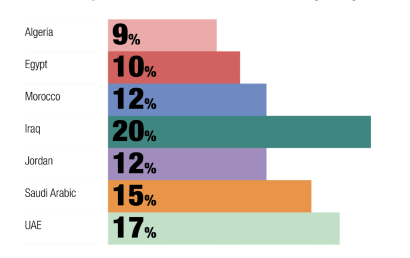Trans people face violence across Middle East and North Africa, new report finds
Colin Stewart is a 45-year journalism veteran living in Southern…
Authors call on governments to legalize trans identities and prosecute violence

Transgender individuals in the Middle East and North Africa are ensnared in a vicious cycle of state-sponsored criminalization, systemic legal disenfranchisement, and pervasive social hostility, according to a new report from the Cairo 52 Legal Research Institute. The report documents how the absence of legal gender recognition, compounded by the active prohibition of gender-affirming healthcare, exacerbates discrimination in employment, housing, and education.
Trans people in the Middle East and North Africa are often subject to violence, arbitrary arrests and digital entrapment according to the report, which was authored by a trio of researchers from across the region. They say that their research found a community with a clear vision for its own liberation, with primary goals of legal gender recognition and gender-affirming healthcare.

Because many people in the region consider gender-nonconforming people to be sinful and/or mentally ill, they are often victims of violence.
For instance, Ezz, a 26-year-old transgender man, died in Cairo in 2021 as a result of medical negligence after seeking treatment at an underground surgical facility. In 2023, Edan Knight, a 23-year-old Saudi trans woman, died by suicide following extreme conversion therapy imposed by her family.
So-called “honor killings” represent another significant manifestation of violence. In 2022, Doski Azad, an Iraqi Kurdish trans woman, was allegedly murdered by her brother, who has yet to be held accountable for this crime. Similarly, in 2019, Hajar Al-Asami, a Kuwaiti transmasculine individual, was killed by their brother, who received a lenient sentence under honor killing statutes.
The state is also implicated as a perpetrator of lethal violence. In 2024, Jojo, an Iraqi trans woman influencer, died under mysterious circumstances while in state custody in a male prison. That same year, a Syrian trans woman was allegedly murdered by authorities in northwestern Syria in collusion with her family.
Finally, murders perpetrated by social actors occur with alarming impunity. In 2024, Semsm, an Iraqi transgender blogger, was stabbed to death in public, and in 2023, Noor BM, another Iraqi influencer, was shot and killed. In both cases, the assailants remain at large.
The report concludes that while documentation efforts are crucial for preserving the memory of the victims, the pervasive nature of this violence complicates comprehensive tracking.
According to the researchers’ survey of 102 people in 14 MENA countries, most trans people were born into conservative and middle-class families. A noteworthy finding is that this community largely emerges from traditional societal structures, with 68% originating from middle-class backgrounds and 77% from conservative environments. This contextual framework is essential, as it implies that most individuals are navigating their identities within familial and social settings that are not inherently liberal or accepting.
The community exhibits considerable diversity in identity, challenging the rigid binaries that prevail within the region’s legal and social frameworks. Among trans participants in the study, 41% identify as women and 32% as men, while a significant 27% identify as non-binary or genderqueer/fluid.
This diversity extends to sexual orientation, with only a minority identifying as heterosexual (26%), while pansexual, queer, gay, lesbian, and bisexual identities are notably prevalent. This illustrates a complex community whose identities resist easy categorization and frequent conflict with heteronormative social expectations.
The report urged action to improve the lives of trans people:
- Policymakers are urged to decriminalize transgender identities, establish clear and accessible processes for legal gender recognition, and regulate access to gender-affirming healthcare.
- Funders are encouraged to adopt a dual-track strategy that supports both long-term advocacy for systemic changes and the immediate, life-saving services that the community requires for survival.
- NGOs and Civil Society are called upon to provide the essential grassroots services identified by the community, such as health support, legal aid hotlines, and emergency shelters.
For more information about transgender people in the MENA region, download the full report.




